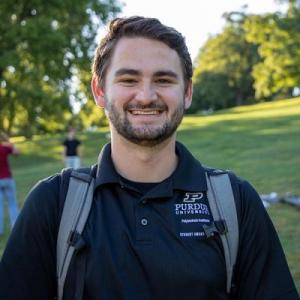Describe your potential job duties
I will rotate across different technology organizations within Comcast/NBCUniversal throughout the country over the next two years. The rotations span Back End, Cloud Computing, Data Engineering, Data Science, DevOps, Front End, Machine Learning, Mobile Development, Monitoring, Network Entering, Cybersecurity, and more.
In what ways did the Polytechnic and/or Purdue help make you uniquely qualified for your new job?
Purdue’s dedication to providing career and internship opportunities was evident even when I visited campus as a prospective student. I remember hearing about the companies that were coming to campus, the internships students were taking, and the jobs that graduates were leaving with and wanting that payoff for myself. It was such an awesome experience to see that come to reality and have those opportunities available to me during my 4 years at Purdue as well. College is a huge investment, so having resources to ensure success for after graduation like career fairs or the Center for Career Opportunities was so helpful from my first semester on campus to my last. The Polytechnic specifically helped make me uniquely qualified for my future career by providing hands-on and project-based learning within a supportive community. In my interviews for internships and jobs it was so easy to think of examples where I had not only learned about a topic, but had implemented a complex project with a diverse group of students that highlighted the skillsets companies were looking for alongside my project management abilities. Even through extracurricular activities like undergraduate research, student organizations, and on-campus jobs, I was constantly able to develop my technical skillset, my leadership abilities, my problem solving skills, and even my interests outside of my major. I even had time to add on a few minors to my plan of study to steer my computing degree into a few different passions of mine and see where the fields intersected. Something I’ve noticed about attending such a large, well-known university is that it is impossible to outgrow Purdue. There is never a boring day on campus and there are always new experiences for students around every corner. I wouldn’t trade the past 4 years for anything in the world.
Who would you like to thank as you finish your time at Purdue and start your career?
There are so many people who have helped me along the way. My academic advisor, Lauren Lucas, has been so helpful throughout my time at Purdue to make sure I was getting the most out of my classes and academics. Even when I had unexpected hiccups along the way, I knew she was always in my corner. My boss at the CoRec, Courtney Wininger, has provided mentorship and opportunities for me to develop my leadership and management skills. Her integration of Purdue’s Steps to Leaps program within job trainings and development sessions has been an enriching experience to my education. The entire Boiler Gold Rush leadership team, Craig Johnson, Virginia Cabrera, Maggie Smith, Jacque Rickett, and Cameron Hoyt have created such a special environment within orientation at Purdue. I’ve never felt so welcomed and excited to be a part of a community. Throughout my leadership time within the organization, I learned so much about myself, my peers, and the intent behind creating inclusive environments. My professors have been extraordinary at connecting with students and providing high-quality education and experiences both in an out of the classroom. Specifically, professors Rich Dionne, Michael McNamara, Eric Matson, Nicole Hands, and Robert Deadman have gone above and beyond in providing excellence in their instruction. Lastly, my fellow students have made this campus into a second home. That list could go on forever, so I’ll just end with a “thank you.”
If you had a favorite class, project, experience, or professor, what/who was it, and why?
My favorite project was for my Cloud Computing class (CNIT 48101). We had to physically build a network of computers then use those computers to develop a cluster that could support multiple clients, jobs, virtual machines, containerization workflows, virtual networks, and storage solutions. It was like building Amazon Web Services or Microsoft Azure from scratch. My group then built a stock analysis dashboard as a demo project using our custom cloud computing platform to prove that our implementation was functional. By learning how to scale systems, secure systems, auto configure computing instances, and deploy efficiently, I could see the skills I had learned in so many different classes, internships, and labs coming together under one project. We worked with software like Linux cloud-init, Docker, Kubernetes, Quarkus, and PostgreSQL.

